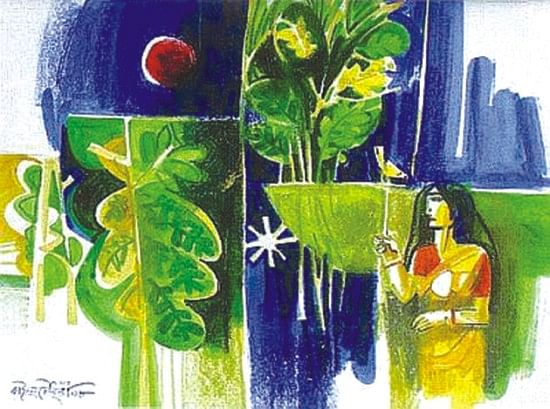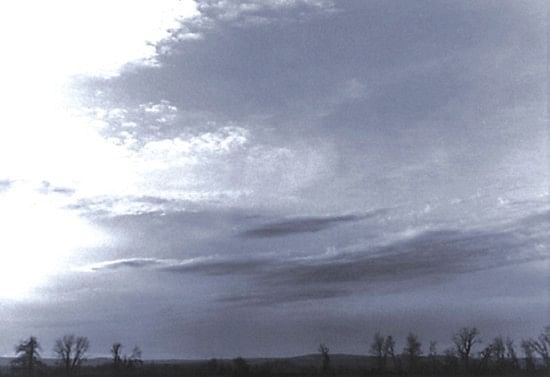| One Off
“Charu” and the World Around Her!
There was a gloom in the sky. It was not to be. It rained the whole day and the sky had cleared suitably for the full moon to emerge in the east. Tonight was meant to be bright and luminous. Usually, the monsoon nights and days are difficult to predict in terms of clarity. But some monsoon days, especially when the sun begins to descend in the west and the cloud presents fantastic forms; it creates patterns of a painting on a huge canvas. And the painting is not over yet. It continues to metamorphose into different shapes, different colours and different glows as it approaches finality. Such moments are meant to be exhilarating. Nature's endowment usually is connected to well being of the human being. But such splendour as the gloom in the sky brings thoughts of pain, of despair. This is what was coming to mind that afternoon. Though that afternoon was not different from any other afternoon, yet stray thoughts kept lingering.
 |
Painting by Qayyum Chowdhury. |
***
About forty years ago, in a locality of old Dhaka a youngman in his late teens was aimlessly walking through a deserted lane. All on a sudden he came across a girl of almost the same age standing in the veranda of a one storied building. She was in ordinary domestic attire. A sari wrapped around her. Busy in some household chores. The youth was stunned by her extraordinary beauty. He stopped and seemed to have become transfixed. The girl, exceedingly embarrassed, looked down and started digging the floor with her toe. The youngman, also, had become self-conscious now. He cast his gaze down. Some one in a woman's voice called aloud “Charu”. The girl was suddenly awakened, as if from a spell, and hurried back in. The youngman also hastened away from the house to wherever he was going. The following day there was a repeat of the scene of the previous day. The digging of the floor with the toe, the down cast eyes, the embarrassment and what not. Though these brief meetings became regular and daily affairs, hardly any words were exchanged. One morning the youngman saw that all windows and doors of “Charu's” home were shut. The gentleman next door informed that they had left for India the previous night. This was soon after the communal riot of 1964. The youngman sat on the steps of the stairs leading up to the veranda. Tears welled up in his eyes. He thought that he should do something to improve the world around the inarticulate “Charus”.
***
In 2001, soon after the general elections of Bangladesh, the youngman of 1964, now matured and greying, accompanied a group of intellectuals to see the ravages of a communal onslaught on the villages inhabited by non-Muslims who had ostensibly voted against the party that came to power then. The man saw in the village so many “Charus” who were dishonoured. They were told that bands of young hooligans came in microbuses and having done their job of raping and looting left the place before dawn. The man thought, how time had changed! And the society still functioned. Hardly any one spoke against this malevolence. He thought that this nation was born so that every individual could practise their faith with absolute liberty. This was a nation that enunciated civility and inherent democratic rights of all its citizens in its constitution. Where had all the promises evaporated? How could political expediency overthrow constitutional obligations out of the window? He also thought that this society and its guardians will soon be afflicted by its own indifference. Such impunity could not possibly have passed off unnoticed.

***
Years had gone by. The world had travelled quite a distance. The modern society had started on its journey towards an ostensibly civilised world. People, even in poverty-stricken Bangladesh, started becoming conscious of social obligations and were talking about responsible behaviour. Women came to the fore of opinion building. They were talking about their rights. In a world of near sexual equity the “Charus”, irrespective of religion or ethnicity, fell victim to the terror of wanton acts of acid terrorism, of confinement from the public gaze, of teasing that made them choose freedom and honour in self-annihilation. The scenario had changed, the predicament did not. It is during such anomaly that the gloom in the pervasive clouds seems so fearsome and unwanted.
Copyright
(R) thedailystar.net 2010 |
|
